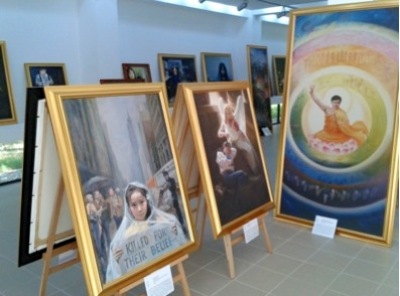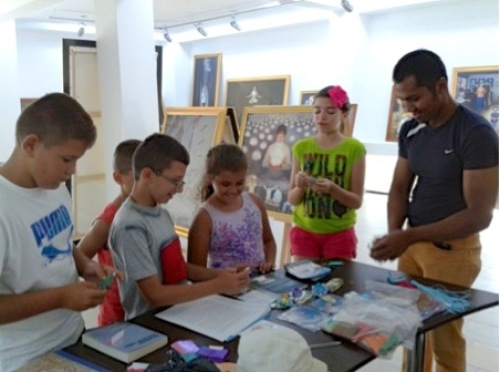Romania: The Art of Zhen-Shan-Ren International Exhibition Visits Turnu Severin (Part 2 of 2)
(Continued from Part 1)
(Minghui.org) The Art of Zhen-Shan-Ren International Exhibition moved to the Exhibition Pavilion in Crihala Forest in Drobeta Turnu Severin on August 11, 2014. Well-known local arts expert Ph.D. Maria Bălăceanu spoke about the paintings, and many people came to view the works of art.
Falun Dafa volunteers demonstrated the exercises and talked about Falun Dafa, the art on display, and the persecution taking place in China. They also handed out flyers to passersby and served as guides at the exhibit.
Children Intrigued
Many families with small children came to see the paintings. The practitioner guides were surprised that the children were very keen to hear the stories behind the paintings. Many children told their friends about the paintings and lotus flowers, encouraging more to come. One child, only about a year and a half old, came running in first, with his parents following along behind.
Another boy, about 12, exclaimed, "Wow” as he saw each new painting.
One of the main attractions of the exhibition was the making of paper lotus flowers by hand. As their parents studied the artworks, the children watched intently how beautifully colored lotus flowers, just like those in the paintings, were made. To understand the symbolism of the lotus flower, each child was give a copy of the "Story of the Lotus Flower.”
Adults' Reactions
One lady who had practiced meditation was interested in learning more about Falun Dafa. Practitioners directed her to the falundafa.org website. Others who wanted to find out more about Falun Dafa took informational flyers.
One man was surprised at the practitioners’ gentle approach, as he had seen other practices brag about their qualities, wanting to get everyone to practice their way. The kindness of the Falun Dafa volunteers surprised him.
One visitor told of how he used to work around communist "comrades” during Ceauşescu’s regime, and that it was plain to see how malicious those people were back then. He saw how the children were mistreated in reform schools, and that political prisoners were confined with criminal offenders. He commented on how nice it would be if Falun Gong triumphed worldwide, and everyone practiced.
Another man described how he went to China for the Olympics and saw security agents everywhere. He almost lost two valuable books to the police, who were going to confiscate them until he showed an official credential, after which they left him alone. Looking at the paintings, the man said he was reminded of stories from the Bible about the saints from ancient times.
Two police officers were interested in the exhibit, and in finding out about the Falun emblem. When they heard the explanation regarding divine justice and the way good is rewarded with good and evil with evil, they said to one another, more or less seriously, that they should be careful how they behave. They asked for flyers about the practice.
A man who was joking around, disregarding the solemn atmosphere of the exhibit, realized after talking with practitioners that he should be respectful. In the end he became very quiet, took some Falun Dafa flyers, and whispered to his friend.
A 40-year-old man in dirty clothing and having difficulty speaking stood for an entire hour reading the explanations on all of the paintings. He was utterly humble. The volunteers were reminded that one must not judge a person by his appearance, and that however humble and poor a man might be, he can have a noble soul that can understand Dafa, and can position himself correctly.
Toward the end of the exhibition, children came and asked for colored paper so that they could make origami lotus flowers by themselves. A workshop was organized, and the kids taught one another how to fold the lotus flowers.
Many visitors expressed their gratitude for the way in which the event was organized, and for the information. Some were saddened by the scenes of brutality.
A young teacher visited the exhibition and posted on Facebook a photo of the "Lotus Candle” – a painting by Xiaoping Chen commemorating the victims of the persecution–with a comment taken from the Story of the Lotus Flower, which she found quite remarkable.
Her colleague came to see the paintings for herself the following day. They both thought it would be a great idea to organize an event in their own school by displaying a few of the paintings and asking a practitioner to show their pupils the exercises and the origami lotuses, and tell them "The Story of the Lotus Flower.”
The Art of Zhen-Shan-Ren in the Words of an Art Expert
 Maria Bălăceanu, PhD in art, talks about The Art of Zhen, Shan, Ren Exhibition
Maria Bălăceanu, PhD in art, talks about The Art of Zhen, Shan, Ren Exhibition
Ms. Maria Bălăceanu, who has a PhD in the field of art and is a former director of the Severin Arts Museum, gave a talk about the works in the exhibit. She said, in part:
“This contemporary artwork is rooted in traditional art. […] Still, it can be considered part of a current trend called hyperrealism, which presupposes an accurate rendering of reality...
“These works capture the realities of a contemporary society in which people suffer like many have suffered before [...] in the Dark Ages and under dictatorships, like the fascists or the communists. In our country (Romania), too, people have endured medieval-like tortures in communist prisons. Ever since their emergence, the communists have fought against freedom. The idea is almost beyond belief, but the harshness and lack of humanity displayed by those in China exists. This is because a totalitarian state doesn’t need people who think freely. Freedom of thought implies a lack of submission. The Chinese people in ancient times had freedom of expression. In totalitarianism, one is not allowed to be free to think for oneself, and we, who are adults (and lived through those dark times), know what that means.
“I remember that when the Cultural Revolution was in full swing in the 1960s, just knowing that someone possessed a violin or a forbidden book could result in immediate execution.
"The people depicted in these works are not only Chinese, but of all nationalities from throughout the world, especially in the joyful, beautiful, and truly bright part of the exhibition. It shows us that this phenomenon has extended way beyond the borders of China, where people are still dying for this freedom to believe."



